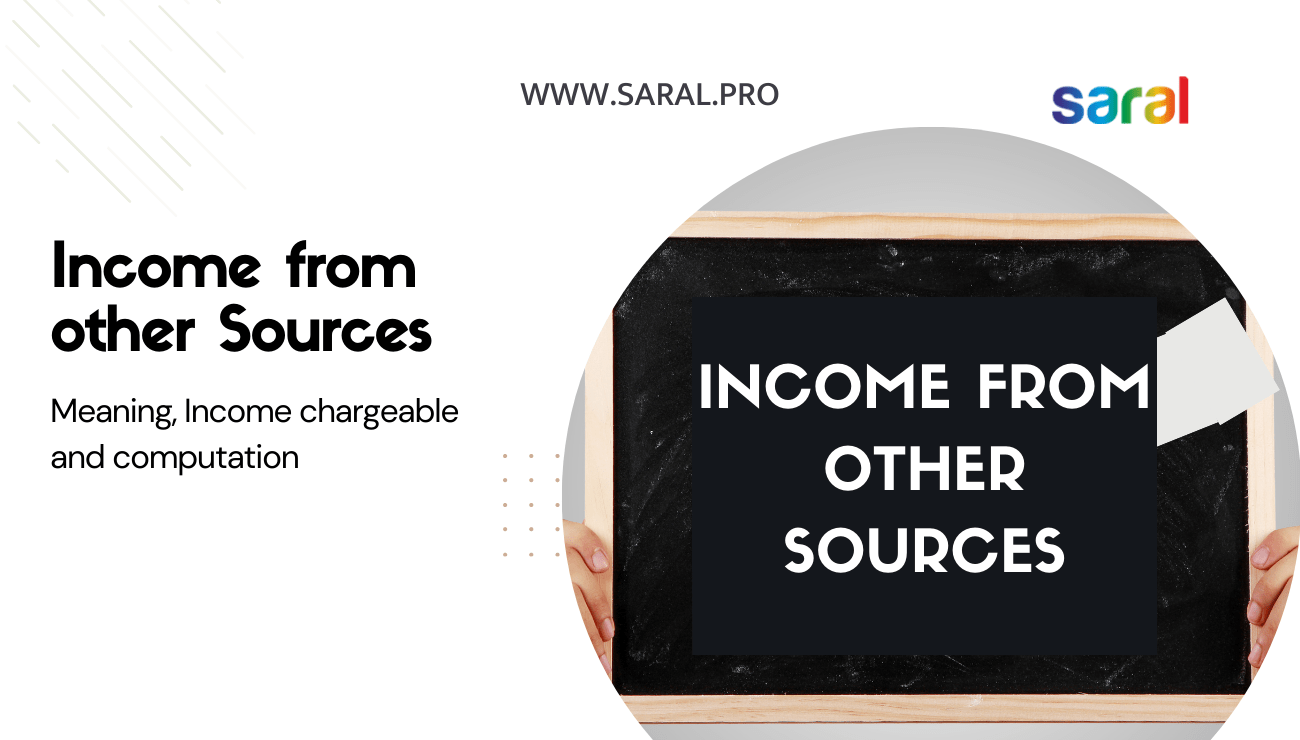Income from other sources
A detailed guide to Income from other sources
What is Income From Other Sources?
According to the Income Tax Act, the fifth head of income classification is Income from Other Sources. In other words, it is a residuary source of income, which covers all the incomes not included in other main heads of income. As a result, incomes that do not fall under any other head of income are classified as income from other sources.
Heads of Income
A taxpayer’s income may come from various sources. For example, a salaried employee receives a salary as their source of income. Additionally, he might have purchased shares of some listed companies from which he might receive a dividend.
A taxpayer’s income is classified under the following headings for income tax purposes:
Income from salary:
This category of income includes tax on a person’s salary and pension income. In fact, every payment made by an employer to an employee may be chargeable under salaries. There must be an employer-employee relationship inorder to qualify for taxability under this head.
Income from house property:
A taxpayer must pay taxes on their rental income under the heading “Income from House Property.” The revenue is based on the property’s yearly valuation, which is determined in accordance with section 23’s rules.
Profits and gains from business or profession:
Any money earned from operating a business or a profession will be categorised under this heading. For example, an auditor, lawyer, doctor, etc. are those who can be considered to be conducting a profession not a business.
Income from Capital Gains:
In this head, profits from the sale of a capital asset, such as land, are taxable. These profits will be taxed in the year of the sale. Additionally, the transfer should result in a gain or a loss.
Income from other sources:
This head of income includes any money that cannot be categorised under the previous four heads of income. For any income to be taxed under this head, it must be chargeable to tax as per the provisions of the act.
Income chargeable to tax under Income from other sources
“Income from other sources” consists of the following types:
- Dividend income
- Any amount of money or property that a person has received
- Interest received on compensation or enhanced compensation is considered income in the year it is received.
- Any income that does not fall under any other head of income.
- The compensation received by an employee due to termination of his employment
- Earnings from casual activities include winnings from lotteries, crosswords, horse racing, cards, and other games.
- Expenses paid for shares of a closely held firm that are issued at a premium and are in excess of their fair market value.
- An amount receiving in respect of a loss allowed as a deduction in the earlier previous year that has been remitted or ceased
Expenditures allowed as deductions under ‘Income from Other Sources
Under section 57, the following expenses are deductible from income from other sources:
- Any commission or payment made to a banker or another individual in connection with interest on securities
- In the case of a family pension, 33-⅓% of such income, or Rs. 15,000, whichever is less.
- 50% of the interest earned on any compensation or enhanced compensation received.
- Any additional expense, not necessarily a capital expense, incurred in order to generate such income
- Current repairs to the equipment, plant, or furniture, insurance premiums, and depreciation in the case of income from renting out equipment, plant, and furniture.
- In the case of dividends or income relating to mutual fund units, interest expenditure is permitted as a deduction subject to a maximum of 20% of such revenue.
Expenses not Deductible while Calculating Income Tax
When calculating the income chargeable under the head “income from other sources,” the following expenses are not deductible:
- The assessee is responsible for all personal expenses.
- Any payment that falls under the head salary tax laws but is made outside of India without tax withholding.
- A resident who has not deducted or has not paid tax on a sum payable before the due date of the return will be subject to 30% tax since the tax is deductible at source.
- Paying a related party for an expenditure is excessive if the assessing officer considers it excessive based on fair market value
- If you spend more than RS.10,000 on a person by means other than a payee cheque, bank draft, or ECS, or by other electronic methods such as IMPS, BHIM Aadhar Pay, NEFT, or using a credit card, debit card, net banking, or other electronic methods.
How to fill ‘Income From Other Sources’ in ITR?
When filing an income tax return for any assessment year, a taxpayer must disclose all of their income. Under schedule OS, the assessee must fill out the information on their other source of income. Below are a few components of the section:
- Gross interest income
- Dividends, gross
- Rental income from machinery, plant, etc, gross
- Sum of money received as a gift if exceeding Rs. 50,000
- Winnings from lotteries, crossword puzzles
- Any other income chargeable to tax at special rates
We have reached the conclusion of Income from other sources. Share your views and opinions with us in the comment section below.






